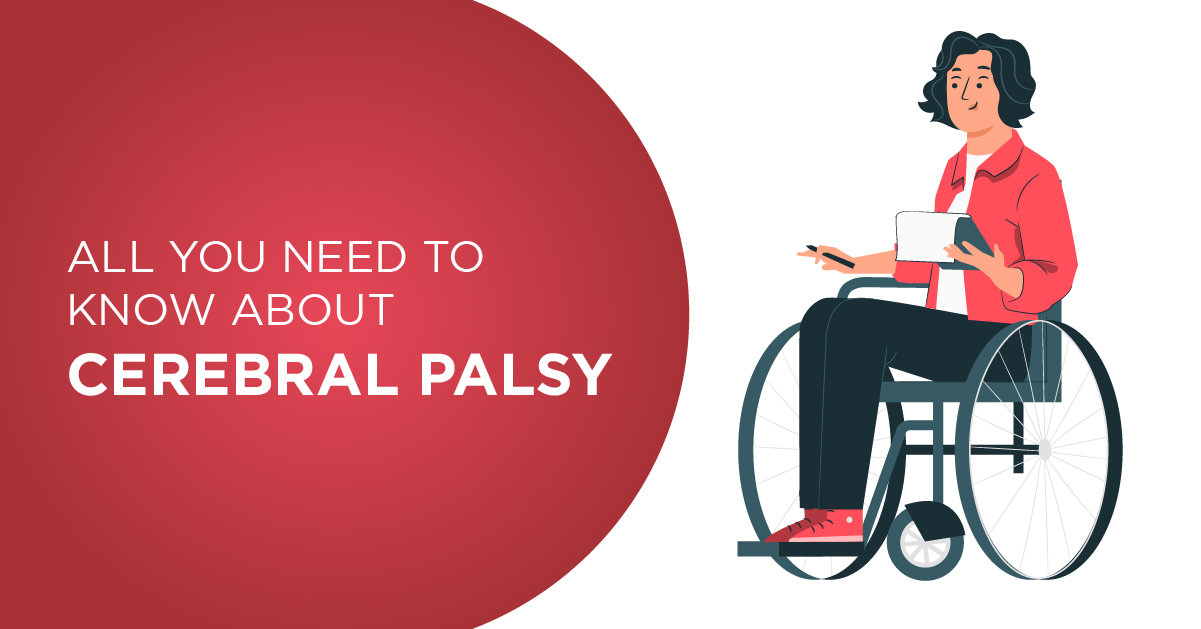All you need to know about Cerebral Palsy

What is Cerebral Palsy?
Cerebral palsy—also known as CP—is a condition caused by injury to the parts of the brain that control our ability to use our muscles and bodies. Cerebral means having to do with the brain. Palsy means weakness or problems with using the muscles. It develops due to brain damage shortly before or during birth.
The condition affects different body parts, so its symptoms and severity can vary. Additionally, cerebral palsy does not improve or worsen as a child grows, but complications stemming from the condition can cause additional health issues. Cerebral palsy occurs in 1 in every 300 children.
Cerebral Palsy Symptoms
Below are some common cerebral palsy symptoms. Not every child with cerebral palsy may have all of these symptoms.
- Muscle tone variation (overly stiff in some areas, floppy in others)
- Rigid or floppy muscles
- Abnormal reflexes (such as excessive or underdeveloped reflexes)
- Abnormal posture
- Difficulty maintaining balance
- Eyes unable to focus on the same object
- Reduced range of motion
- Delays in motor skill development
- Impaired gross motor function
- Difficulty with fine motor control
- Difficulty swallowing or excessive drooling
- Delays in speech development or difficulty speaking
- Tremors or involuntary movements
- Seizures
Cerebral Palsy Causes
CP occurs when the developing brain experiences an injury that does not get worse over time and cannot be cured. Some of the leading causes of cerebral palsy are as follows:
- Bleeding in the brain before, during or after birth
- Traumatic brain injury- a major cause of cerebral palsy
- Lack of oxygen to the brain
- Lack of blood supply to the brain (stroke)
- Seizures
- Infections of the brain or spinal fluid
- Certain genetic conditions
How is Cerebral Palsy Diagnosed?
Cerebral palsy diagnosis is done mainly by evaluating how a baby or young child moves. The doctor will evaluate the child’s muscle tone, which can make them appear floppy. Others have increased muscle tone, which makes them appear stiff, or variable muscle tone (increased at times and low at other times).
Cerebral Palsy Treatment
Cerebral palsy treatment depends on several factors including the patient’s age, the type of symptoms the child is experiencing, and the severity of symptoms.
Some of the therapies used to treat children with cerebral palsy include:
- Physical therapy
- Occupational therapy
- Oral medications
- Botulinum toxin
- Speech therapy
- Behavioural therapy
- Drugs used to control seizures and muscle spasms
- Special braces or orthotics can compensate for muscle imbalance
- Splinting to improve muscle function
- Orthopaedic surgery to correct contractures or improve function
- Counselling for emotional and psychological needs
Therapy, medication, and surgery can help improve your child’s quality of life. Depending on how severe their condition is, patients may be able to live independently or require lifelong care. While complete cerebral palsy prevention is not possible, you can take some active steps against it by vaccinating your child, and identifying early symptoms. Fortunately, there are various support and financial resources available to help families affected by cerebral palsy.
Request a call back


 Call-an-Ambulance
Call-an-Ambulance



